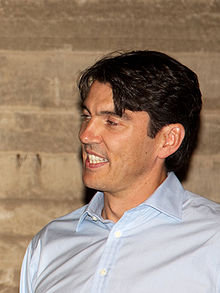
You've got some good ideas, son. But you're doomed unless you move faster, and move in the right direction.
I notice that you have actually bought some good titles, like Engadget and TechCrunch. You have a good idea, in theory, with local news. And you were right to give others work you don't want to do yourself.
But notice something about your successes? First, they're entrepreneurial efforts. Second, they don't go by the name AOL.
So ditch it. Toss it out. It has negative brand equity. Anyone who's been on the Internet longer than three minutes knows what AOL means, and what it means is the tones a modem used to make. Sorry. I don't care what you call it. Call if Armstrong Online if you want. Just ditch that old name and old logo — if you use your own name you can keep the AOL URL but that's it.
Second, only bring in entrepreneurs. Don't hire journalists. What you're trying to build is an enormous chain of local newspapers. You know what that means? It means you need thousands of people who can understand, organize and advocate for neighborhoods and small communities. Not editors, Tim. Publishers.
And let them sell their own advertising. Please.
Journalists are people who work for people who buy ink by the barrel, or bandwidth by the T-3. They're like cooks in a restaurant, a pirate crew you have to keep your eye on at all times, and keep focused on clearly designated assignments.
I've seen what a good editor can do with the Decatur Patch. It sucks. It's a jumble. Because it's looking through the wrong end of the telescope. (No offense. It's the same end I was trained to look through.)

When Ken Auletta calls most of what you publish "piffle," what he means is it's irrelevant to him. As it should be. When I call it "piffle" I mean it's irrelevant to your target market. Only entrepreneurs, publishers, can organize those markets. Journalists like Auletta never will.
So think of Patch as a franchising operation. Fire all your writers, but offer them a revenue share instead. Tell them you want them to build businesses, and that you'll sell their patches (or a growing share of them, up to 49%) to whoever can extract the most money from them. Organize conference calls, then conferences, among your most successful publishers, and let them make money for themselves, some of which will naturally flow to you. Then have them hire the journalists, but encourage pay based on performance, on page views. Everyone becomes an an entrepreneur.
And I want an ad on every page, even if it's just a house ad. We're not running a charity here, we're running a business.
Then give them some serious resources, something that automates the collection of raw data they can work from. Like Everyblock. Link with every outside resource you can — Trulia, Facebook, Twitter, Yelp, police reports. There has to be something new on every page every minute. Not "stories" — those are just follow-ups to the raw data. Blog posts. Your publishers want to bring in editors who will shake things up in those communities, every day. If they're not being talked about in the barber shops and on the soccer fields they're not doing their j-o-b-s.
What distinguishes what you've been trying to do from what you need to do is entrepre
One more thing, Tim. Don't just think Web. Think e-mail, which you make certain goes to every thought leader in each community. Think about printing broadsheets for distribution in every local coffee shop and gas station, extracting stuff from the local site. Add podcasts. Video. An annual business directory.
Organize, Tim. Get to know everyone in town, and their story, so when something happens you can tell someone how to get the story straight.
Just don't hire journalists. Create publishers. Don't cover stuff. Build businesses.









